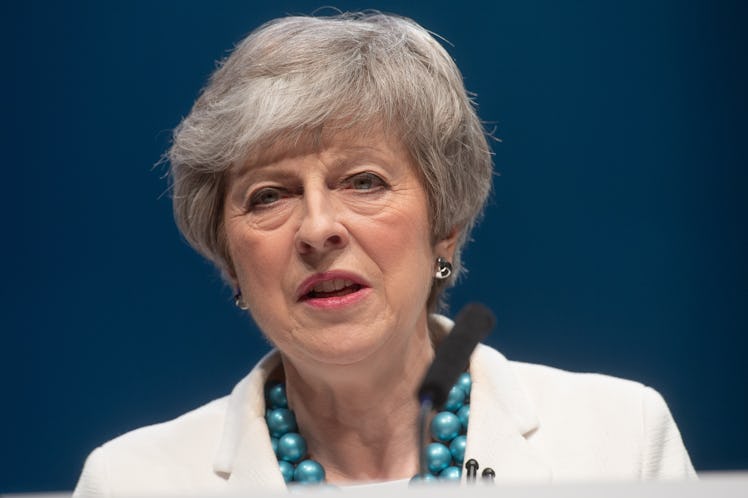
Here's Why Theresa May Stepped Down As The UK Prime Minister
British Prime Minister Theresa May is moving on. She announced her resignation as conservative leader, effective June 7, in a tearful speech shared Friday, May 24, bringing to end a tumultuous few years as the leader of the United Kingdom. So, why is Theresa May resigning? The move comes after she failed to lead Britain out of the European Union (EU).
May had been facing calls to step down over her failure to secure the United Kingdom's withdrawal from the European Union (aka "Brexit") and it looks like she finally caved into the pressure. If you're not familiar or just need a refresher, it's been nearly three years since the UK voted to leave the European Union, which is an economic and political partnership of around 30 countries. But May has failed to deliver a plan, prompting political blows and widespread criticism.
She announced her resignation in Downing Street on Friday morning, per The Guardian. During the address, the politician said serving as Britain's second-ever female prime minister had been “the honor of my life." With her voice cracking, she went on to say that she would resign from her post “with no ill will, but with enormous and enduring gratitude to have had the opportunity to serve the country I love." While she expressed pride in what she viewed as her government's achievements, from funding mental health programs to reducing unemployment rates, she admitted that Brexit was kind of a nightmare. “It is and will always remain a matter of deep regret to me that I have not been able to deliver Brexit," she said.
According to CNN, May said she would step down as the leader of the conservative party on June 7, but would remain as prime minister until a replacement is selected. Her party reportedly said that a successor will be chosen by the end of July. It appears that there are even some potential candidates on peoples' mind already.
May said back in December 2018 that she would stand down before the next election in 2022, but the criticism apparently became too overwhelming.
The main impediment to May's leadership over the past few years has been the troubled negotiations over Britain's exit from the EU. While the 2016 vote to leave the EU was based on a public referendum, the actual logistics of how to leave — which involve everything from how to negotiate trade with countries still in the EU to the prospect of chaos at a reinstated border in Ireland — have proved to be difficult, particularly since the EU has to agree to any deal. May had tried to get a Brexit deal through Parliament three times, most recently in March, but the talks collapsed. According to Vox, there has been some trouble getting parties to agree on how the United Kingdom should exit the union.
The United Kingdom was supposed to make its exit by March 29, but the union extended that deadline to April 12. When the United Kingdom still couldn't come up with an agreement, it asked to extend the date to June 30. The EU agreed to a new deadline, but pushed it back much further than June — all the way back to Oct. 31. Vox notes, though, that the extra time may not result in much. "The UK still lacks a deal, still can’t find consensus for a Brexit option, and is still facing a deadline, though not one as urgent as it could have been," the outlet reports.
Perhaps her successor will have better luck. At this point, who knows.